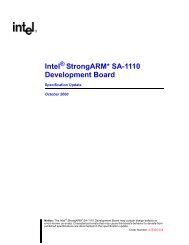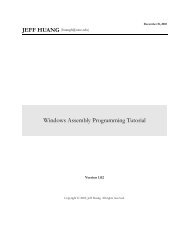Beej's Guide to Network Programming Using Internet Sockets
Beej's Guide to Network Programming Using Internet Sockets
Beej's Guide to Network Programming Using Internet Sockets
- No tags were found...
You also want an ePaper? Increase the reach of your titles
YUMPU automatically turns print PDFs into web optimized ePapers that Google loves.
Beej’s <strong>Guide</strong> <strong>to</strong> <strong>Network</strong> <strong>Programming</strong> <strong>Using</strong> <strong>Internet</strong> <strong>Sockets</strong> 18shutdown() returns 0 on success, and -1 on error (with errno set accordingly.)If you deign <strong>to</strong> use shutdown() on unconnected datagram sockets, it will simply make thesocket unavailable for further send() and recv() calls (remember that you can use these if youconnect() your datagram socket.)It’s important <strong>to</strong> note that shutdown() doesn’t actually close the file descrip<strong>to</strong>r–it just changesits usability. To free a socket descrip<strong>to</strong>r, you need <strong>to</strong> use close().Nothing <strong>to</strong> it.4.9. getpeername()–Who are you?This function is so easy.It’s so easy, I almost didn’t give it it’s own section. But here it is anyway.The function getpeername() will tell you who is at the other end of a connected streamsocket. The synopsis:#include int getpeername(int sockfd, struct sockaddr *addr, int *addrlen);sockfd is the descrip<strong>to</strong>r of the connected stream socket, addr is a pointer <strong>to</strong> a structsockaddr (or a struct sockaddr_in) that will hold the information about the other side of theconnection, and addrlen is a pointer <strong>to</strong> an int, that should be initialized <strong>to</strong> sizeof(structsockaddr).The function returns -1 on error and sets errno accordingly.Once you have their address, you can use inet_n<strong>to</strong>a() or gethostbyaddr() <strong>to</strong> print or getmore information. No, you can’t get their login name. (Ok, ok. If the other computer is runningan ident daemon, this is possible. This, however, is beyond the scope of this document. Check outRFC-1413 10 for more info.)4.10. gethostname()–Who am I?Even easier than getpeername() is the function gethostname(). It returns the name of thecomputer that your program is running on. The name can then be used by gethostbyname(),below, <strong>to</strong> determine the IP address of your local machine.What could be more fun? I could think of a few things, but they don’t pertain <strong>to</strong> socketprogramming. Anyway, here’s the breakdown:#include int gethostname(char *hostname, size_t size);The arguments are simple: hostname is a pointer <strong>to</strong> an array of chars that will contain thehostname upon the function’s return, and size is the length in bytes of the hostname array.The function returns 0 on successful completion, and -1 on error, setting errno as usual.4.11. DNS–You say “whitehouse.gov”, I say “63.161.169.137”In case you don’t know what DNS is, it stands for “Domain Name Service”. In a nutshell, youtell it what the human-readable address is for a site, and it’ll give you the IP address (so you can use10 http://www.rfc-edi<strong>to</strong>r.org/rfc/rfc1413.txt












